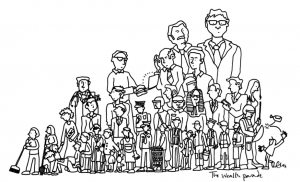Three hundred years of arguments for a basic income

Review of ‘Basic Income: A Radical Proposal for a Free Society and a Sane Economy, by Philippe van Parijs and Yannick Vanderborght’
by Danny Dorling, March 16th 2017, Times Higher
This is a book about multiple emancipations. What would it take for all women to be free – by unshackling the countless numbers who are financially dependent on men? What action would free up enough people, men and women, to care for others who might otherwise live in fear, especially in countries where much more social care will be needed in the very near future?
Philippe van Parijs and Yannick Vanderborght, an economist and a political scientist, respectively, explain how the academic arguments for a basic income have been growing in strength since they were first made in the late 1700s. Since then, it has become clear to a still small (but growing) group of people that with so many of us no longer able to earn a subsistence income from the land, and with growing automation and ecological limits to sensible consumption, social progress without a basic income cannot be sustainable.
Today the vast majority of our food is grown and harvested through automation, and robots make more and more of our goods; but we cannot use machines to care for each other. Not yet – and, if we are to stay sane, hopefully never. A concern with sanity in a book on economics is refreshing.
A basic income would allow people to care for each other more and to work for others (for whom they would rather not work) less. However, say the authors, “we very much doubt that a generous unconditional basic income will ever be introduced anywhere as a result of a big triumphal revolution. It is more likely to enter through the back door.” By the back door they mean the gradual adaptation of existing complex benefit regimes, via thousands of adaptations following hundreds of experiments.
The authors agree with the late Sir Tony Atkinson, the economist and inequality studies pioneer, that a basic income is likely to be introduced gradually, by compromising primarily on the payment being unconditional. In one such scenario, anyone working in education, or caring for children, the sick or the elderly for 35 hours or more a week (which includes so many current working-age adults) would receive a basic income proportionate to their length of contribution in any tax jurisdiction. It would later be extended to all adults, not least because this approach so dramatically cuts administration costs.
The introduction of basic income would result in less production within firms and more within households. As production within the household is not included in gross domestic product, GDP volume would thus appear to fall, although entrepreneurship should rise as more people would be free to dabble. Van Parijs and Vanderborght explain all this patiently, providing argument after argument as to why its introduction would be “economically clever” and why it is the next logical step to take in a long history of social policies aimed at reducing poverty and inequality. Their proposals are not only clear but also extremely pragmatic.

The wealth parade by Ella Furness